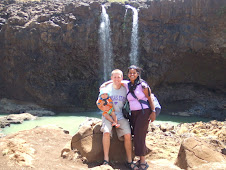 Ashenafe's Family Party
Ashenafe's Family Party  Ashenafe and family
Ashenafe and familyKeegan’s Birthday is in August; Anne was born in December. So when we went to a Birthday Party in November, we were positive the party was not for us. We were told the party was for Ashenafe’s (Who is that? Read the last post!) three year old nephew.
To get to the party, we drove our rented Toyota Rav-4 through essentially a squatter’s village. As we drove slowly past tin and wooden shacks, kids on the path—road is the wrong word—yelled in astonishment: “Mechina! Mechina!” (Car! Car!) I imagine they hadn’t seen many cars on the road before.
Ashenafe’s aunt and her family live in a small shack with mud-brick walls and a tin roof. The house has one room about 10 by 10 feet, enough room for one single bed, a small shelf, and two chairs. Three people live in this small space, sharing one bed. They are lucky, though, compared to the many who live on the streets or in far worse homes.
We sat in the two chairs, Ashenafe on the floor beside us, and the family on the bed. The bulk of the party had been earlier—they showed us pictures of the large pan of bread that was the cake, the number shaped candle, and several little boys piled up on the chairs. This section of the party was apparently for us. They gave us Cokes, salad, bread, injera and stew, popcorn, and an elaborate coffee ceremony. As we ate and they watched, meticulously keeping our plates full, we learned that nobody in the room outside of Ashenafe had a paying job.
We couldn’t talk much because they spoke little English. We used what Amharic we knew, played around with our camera together, and all watched Asher get paraded around the neighborhood. When I got paranoid and went outside to check on the car, little children were simply playing around it, looking at it like a spaceship. Towards the end of the party, our party, we were offered a taste of Tella, a homemade barley beer. It tasted like cigarette butts ground up in water, left in the rain for months to thicken and ferment. They laughed at our faces when we sipped. Despite the taste, the offering and generosity was an honor.
As we drank and stuffed ourselves, we were overcome by the generosity of those who have so little giving to us with so much. The generosity of the poor is a common theme in Ethiopia and all over the world. Ashenafe and Tsehei, for example, consistently give money to the poor and the church. The food and drinks this family gave us dwarfed the tiny gift we brought with us: a small bag of oranges and bananas. Every time we go to an Ethiopian’s house for dinner or a holiday, the party always seems to be about us.
The mud-brick walls of the room were covered in old newspapers from Dubai. Sitting in one of the worn chairs, I was struck by an advertisement in one of the newspapers: “2 bedroom apartment, 26th floor, ocean view, minutes from the beech, $3000/month”. Would the owner of that apartment invite us in? Give us the only two chairs? Give us special food and drinks that they could not realistically afford? Would we find the same selflessness and warmth in that shiny apartment as we found in this 10X10 little room?











